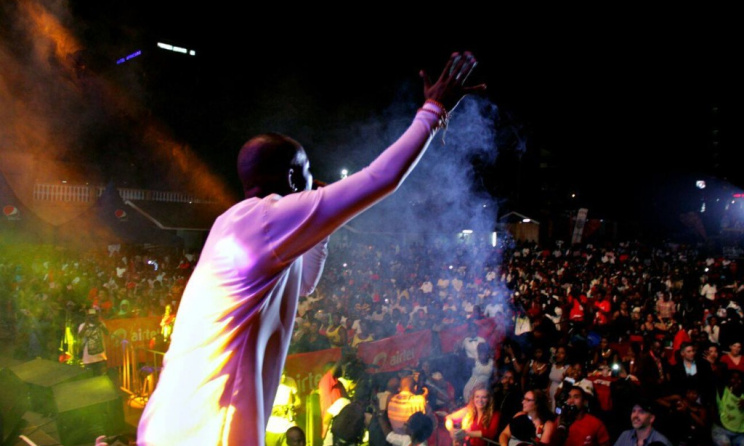Lack of professionalism hurting Ugandan live scene?
When the Second World War ended in 1945, Uganda’s returning servicemen, known as Abaseveni, not only came back with military experience and survival stories, but some had learnt a skill that changed the live entertainment scene in the country. Since then the concert and partying scene in Uganda has always been vibrant.
 Eddy Kenzo at his Mbilo Mbilo Concert. Photo: www.chimreports.com
Eddy Kenzo at his Mbilo Mbilo Concert. Photo: www.chimreports.com Jose Chameleone and Bebe Cool perform at a live event. Photo: www.msetoea.com
Jose Chameleone and Bebe Cool perform at a live event. Photo: www.msetoea.com
Ugandans are well-known for their commitment to partying and having fun. It is quite the norm for clubs in Uganda to have a cover charge which can be anywhere between UGX 17240 and 34481($4 to 9), depending on how new or exclusive the club is. In 2013, when Jamaican artists Konshens and Alaine staged a concert, more than 25 000 music enthusiasts attended. Jose Chameleone’s Valu Valu Live Concert in March 2012 and Badilisha East African Concert in April 2013 can also attest to the love that Ugandans have for live music. Recently Eddy Kenzo’s Mbilo Mbilo concert attracted thousands of fans in both Kampala and Jinja, where the concerts were held between 14 and 16 August.
With such great turn-outs at live concerts, it would be expected that Ugandan music industry operators, especially artist managers and concert promoters, would ensure that events are well planned. However, the country’s music industry lacks proper structure and professional touring circuits, for example, have not been properly developed or exploited in Uganda. The local industry has had to contend with issues such as poor concert management, marketing, promotion, re-branding, piracy, packaging, distribution, globalization and digitalization.
The Uganda Musicians Union, which was created to unite performing artists as well as promote decent working conditions for the industry, has unfortunately done little to ensure that artists reap maximum benefits. The Ugandan government too has not initiated policies to support the creative industry in general.
Ziza Bafana, a local dancehall artist, knows too well the pain of poor management after his Gulumanasomye Batufitina concert failed to take off. Ziza, like Bobi Wine, had a concert scheduled for 7 August in Kampala, but Ziza’s concert did not happen after the Kampala Capital City Authority (KCCA) cancelled it due to lack of proper documentation from the organisers. Word was rife that the cancelation of the concert was partly a result of a misunderstanding and a lack of proper communication from the promoters, although other sources put it down to a lack of proper authorization documents from the KCCA. The latter argument for the cancellation if true was much aided by the former.
The self-styled dancehall artist is now set to reshuffle his management. Ziza says that after a lot of reflection on what transpired, he has seen many loopholes in his management and that’s exactly why all went wrong. But he is not the only artist to experience poor management services in Uganda. In 2014 when Bobi Wine’s charity concert at Hotel Africana turned out to be a flop, the first victim to be fired was his manager. Other musicians to dump their managers in a similar way were David Lutalo, who faulted his then manger of not doing enough to promote him internationally. Eddy Kenzo, too, sacked his manager whom he accused of misappropriating funds and not revealing to him monies that he was receiving from clients. And even though his concert is scheduled to happen on 31 August after the proprietor of Freedom City came to his rescue and offered to host the concert at his premises, Ziza is said to be hunting for new management.
With research by Hipipo showing that artists like Chameleone have a standard charge of about UGX 6million ($1691). For smaller concerts Chameleone is said to charge between UGX 3million ($845) if performing in Kampala and UGX 3.5million (987) if performing in other parts of Uganda. Based on these figures, one would tend to think that a lot of managers should strive to get the right skills in general artist management and particularly in live concert management.
The KCCA has set standards and any promoter worth his name must have a checklist to ensure that all requirements are met. Anyone looking to host a concert in Uganda has to submit an application for an event permit at least 14 days before the event date and pay a refundable security fee of UGX 5 million ($1410). The permits are issued by the Outdoor Advertising team under the office of Public and Corporate Affairs at the KCCA. There’s absolutely no excuse for a promoter to try and transfer the blame of not following these procedures.



























Commentaires
s'identifier or register to post comments